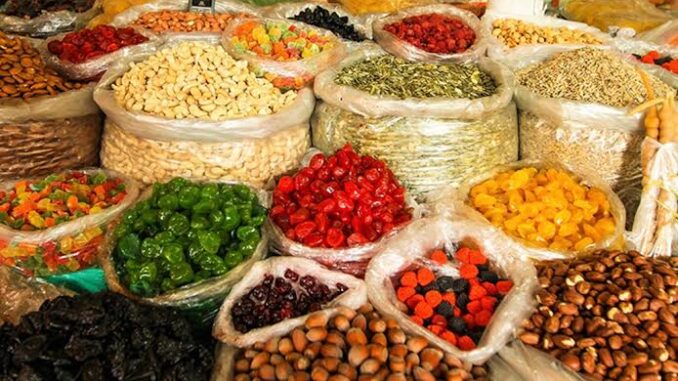
No relief for Nigerians as sky-high food prices bite harder
“When we started this business in February 1994, the prices for commodities at the time were okay. My husband and I started with just N15,000 but without a minimum of over N1 million capital, I don’t think someone can start a comfortable foodstuff business now,” a trader said.
In recent years, the prices of major staple foods in Nigeria have risen significantly.
The situation became more complex after President Bola Tinubu announced the end of fuel subsidy payments during his inauguration as president on 29 May 2023.
The upward trend in the prices of these staples as well as other products has weakened the purchasing power of many citizens, making it difficult for many households in the country to afford daily meals.
Staple foods are the basic foods that make up a significant portion of a person’s diet. This includes foods in the following categories: meat, poultry, or fish, bread or cereals, vegetables or fruits and dairy products.
According to the National Bureau of Statistics (NBS) food inflation rate in December 2023 quickened to 33.93 per cent on a year-on-year basis, which was 10.18 per cent points higher compared to the rate recorded in December 2022 (23.75 per cent).
It said the rise in food inflation was caused by increases in prices of bread and cereals, oil and fat, potatoes, yam and other tubers, fish, meat, fruit, milk, cheese, and egg.
A market survey conducted by PREMIUM TIMES shows that the prices of food products have doubled over the months. Below are some of the staples whose prices have gone up over time.
Rice
Rice is one of the most commonly consumed staples and important cereal in Nigeria with a consumption per capita of 32kg.
As of 2011, according to reports, rice accounted for 10 per cent of household food spending and 6.6 per cent of total household spending.
Over 50 per cent of the world’s population depends on rice for about 80 per cent of its food requirements and about 95 per cent of the global output of rice is produced and consumed in developing countries, according to the Food and Agriculture Organization of the United Nations (FAO). Human consumption accounts for about 78 per cent of global production while the balance serves other uses such as feed.
Rice can be found on every food menu in Nigeria. Either at home or outdoors, social events, ceremonies, in eateries and during all kinds of cultural and religious festivals. It is very easy to prepare and can be prepared in so many ways such as white rice, fried rice, coconut rice, concoction rice and jollof rice among others.
Currently, 50kg of Nigerian rice is sold for between N60,000 as against the N55,000 it was previously sold last year. While foreign rice is sold for between N70,000 and N80,000 as against N65,000 it was previously sold.
Bread
Bread is a staple food prepared from a dough of flour (usually wheat) and water by baking.
Bread, which used to be one of the cheapest staples consumed by all classes of people in the nation, is no longer within the reach of average salary earners.
Earlier in February, the Abuja chapter of the Association of Master Bakers and Caterers of Nigeria (AMBCN) expressed concern over the escalating prices of all baking materials in the country.
Richard Adeyemi, the association secretary, said the survival of the industry could no longer be guaranteed due to the rising cost of all baking materials.

Garri
Garri, one of the most routinely consumed and dominant foods in Nigeria, is gradually going beyond the reach of the masses, as its price keeps increasing daily.
Processed from cassava, the flakes can be consumed raw with water, sugar (and milk and groundnut by people with relatively greater means). It is also used to make Eba, eaten in households and sold in restaurants all over the country.

Egg
The steady upswing in prices has made one of the cheapest sources of protein in the country, a luxury item. Recently, egg prices have continued to surge beyond the reach of an average Nigerian household.

Yam
Yam is a starchy staple in the form of large tubers that are widely grown in humid tropical environments and is another major staple food in Nigeria.
In Nigeria, yam is prepared at numerous events like traditional marriages and is commonly prepared into several dishes such as roasted, boiled, fried, pounded yam. Yam farming is mostly carried out by low-income smallholder farmers in rural areas across the country.

Beans

Beans is a legume which is widely grown by farmers in various varieties. It is one of the most popular and staple foods in Africa, especially in Nigeria and the 4th most consumed after cassava, yam, and rice. It is highly recommended to eat because of its numerous health benefits and nutritional values and also is the main protein source when compared to all other proteinous foods in Nigeria.
Sugar
Sugar is another staple food item that used to be very affordable but has also skyrocketed over time. At present, a 50 kg bag of sugar sold for N55,000 as of last November, now costs N85,000.
Meat
Meat is the flesh of an animal, typically a mammal or bird, eaten as food. Meat is also valued as a complete protein food containing all the amino acids necessary for the human body. A market survey conducted by this reporter also showed that the prices of meat have soared against the price it used to be
A kilogram of meat (beef) sold for N3,000 before is now N4,000.
At the AMAC market, Lugbe in Abuja, Baba Aisha, a meat seller, said “The prices of cow have gone up. Our customers are complaining that meat is costly now. And we, the meat sellers, complain about not seeing cows to buy. If you eventually see sef, it is very costly. So it is not our fault.”

Leave a Reply